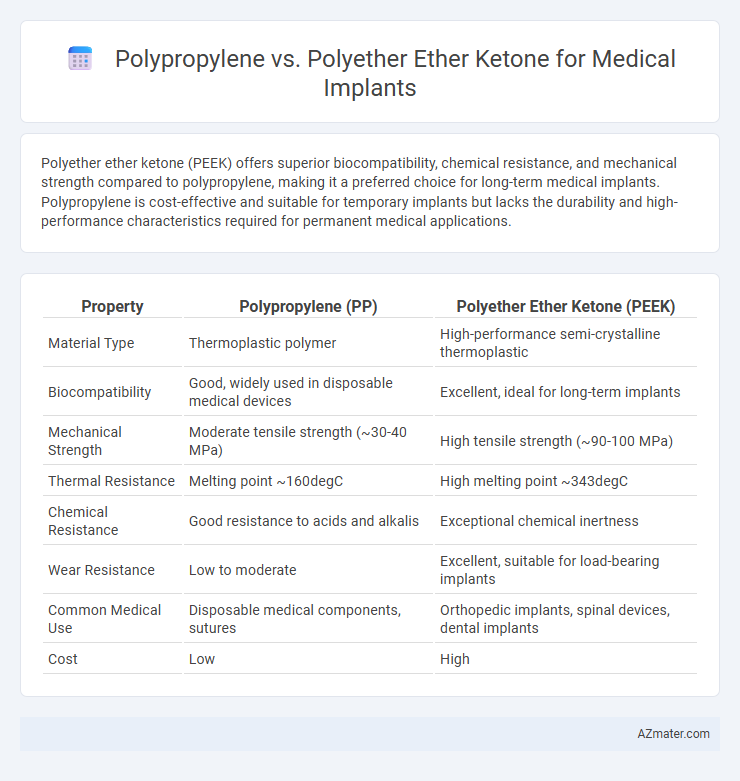Polyether ether ketone (PEEK) offers superior biocompatibility, chemical resistance, and mechanical strength compared to polypropylene, making it a preferred choice for long-term medical implants. Polypropylene is cost-effective and suitable for temporary implants but lacks the durability and high-performance characteristics required for permanent medical applications.
Table of Comparison
| Property | Polypropylene (PP) | Polyether Ether Ketone (PEEK) |
|---|---|---|
| Material Type | Thermoplastic polymer | High-performance semi-crystalline thermoplastic |
| Biocompatibility | Good, widely used in disposable medical devices | Excellent, ideal for long-term implants |
| Mechanical Strength | Moderate tensile strength (~30-40 MPa) | High tensile strength (~90-100 MPa) |
| Thermal Resistance | Melting point ~160degC | High melting point ~343degC |
| Chemical Resistance | Good resistance to acids and alkalis | Exceptional chemical inertness |
| Wear Resistance | Low to moderate | Excellent, suitable for load-bearing implants |
| Common Medical Use | Disposable medical components, sutures | Orthopedic implants, spinal devices, dental implants |
| Cost | Low | High |
Introduction to Polypropylene and Polyether Ether Ketone
Polypropylene is a thermoplastic polymer known for its chemical resistance, flexibility, and cost-effectiveness, making it a common choice for medical implants such as surgical meshes and orthopedic devices. Polyether ether ketone (PEEK) is a high-performance engineering polymer characterized by exceptional mechanical strength, biocompatibility, and resistance to sterilization processes, often used in spinal implants and dental prosthetics. Both materials offer unique advantages based on their molecular structure, with polypropylene providing lightweight versatility and PEEK delivering superior durability for demanding medical applications.
Material Properties Comparison
Polypropylene offers excellent chemical resistance, low cost, and good biocompatibility, making it suitable for temporary medical implants, but it lacks high mechanical strength and thermal stability. Polyether ether ketone (PEEK) features superior mechanical properties, high thermal resistance, and outstanding biocompatibility, making it ideal for long-term, load-bearing medical implants such as spinal cages and orthopedic devices. PEEK's resistance to sterilization processes and low wear rates further enhance its suitability compared to polypropylene in demanding medical environments.
Biocompatibility and Safety in Medical Implants
Polyether ether ketone (PEEK) exhibits superior biocompatibility and safety compared to polypropylene in medical implants due to its excellent chemical resistance, mechanical strength, and bio-inert nature, minimizing adverse tissue reactions. Polypropylene, while cost-effective and widely used, has a higher risk of inflammatory response and lower structural integrity under physiological conditions. PEEK's stability under sterilization processes and its resistance to bodily fluids make it the preferred choice for long-term implant applications requiring sustained biocompatibility and patient safety.
Mechanical Strength and Durability
Polyether ether ketone (PEEK) exhibits superior mechanical strength and durability compared to polypropylene for medical implants, with tensile strength typically around 90-100 MPa versus polypropylene's 30-50 MPa. PEEK maintains structural integrity under high-temperature sterilization processes and prolonged bodily exposure, whereas polypropylene tends to degrade and lose mechanical properties over time. The high wear resistance and chemical stability of PEEK make it the preferred material for load-bearing implants requiring long-term performance.
Chemical Resistance and Sterilization Methods
Polyether ether ketone (PEEK) exhibits superior chemical resistance compared to polypropylene, maintaining structural integrity when exposed to aggressive sterilization methods such as autoclaving, gamma radiation, and ethylene oxide. Polypropylene, while cost-effective and lightweight, tends to degrade or lose mechanical properties under high-temperature steam sterilization and aggressive chemical environments. The enhanced chemical stability and broad compatibility with sterilization modalities make PEEK the preferred polymer for long-term medical implants in corrosive or demanding clinical settings.
Applications in Medical Implants
Polypropylene is commonly used in medical implants for sutures, meshes, and hernia repair due to its biocompatibility, flexibility, and cost-effectiveness. Polyether ether ketone (PEEK) offers superior mechanical strength, chemical resistance, and radiolucency, making it ideal for load-bearing implants like spinal cages, orthopedic devices, and dental implants. The choice between polypropylene and PEEK depends on the specific implant requirements, with PEEK favored for high-performance structural applications and polypropylene for soft tissue integration.
Cost Considerations and Manufacturing Ease
Polypropylene offers significantly lower material costs and simpler processing techniques compared to Polyether ether ketone (PEEK), making it more cost-effective for medical implant manufacturing. PEEK, while more expensive, provides superior mechanical strength and biocompatibility but requires advanced machining and injection molding equipment, increasing production complexity and cost. The choice between polypropylene and PEEK hinges on balancing budget constraints with performance requirements and manufacturing capabilities in medical implant applications.
Clinical Performance and Case Studies
Polyether ether ketone (PEEK) demonstrates superior biocompatibility, mechanical strength, and resistance to sterilization processes compared to polypropylene in medical implants, leading to enhanced clinical outcomes in orthopedic and dental applications. Clinical case studies document PEEK's minimal inflammatory response, stable osseointegration, and durability under physiological loads, whereas polypropylene exhibits higher rates of implant-related complications such as foreign body reactions and degradation. The evidence supports PEEK as a preferred material for long-term implant success, particularly in load-bearing and precision medical devices.
Regulatory Approvals and Compliance
Polypropylene and Polyether ether ketone (PEEK) differ significantly in regulatory approvals and compliance for medical implants, with PEEK benefiting from extensive FDA and ISO certifications due to its superior biocompatibility and chemical resistance. Polypropylene, while FDA-approved for certain medical uses, often faces limitations in long-term implant applications owing to its lower mechanical stability and potential for degradation. Regulatory bodies prioritize PEEK for spinal, orthopedic, and dental implants, reflecting its established track record in meeting stringent safety and performance standards.
Future Trends in Medical Implant Materials
Polyether ether ketone (PEEK) is rapidly gaining prominence over polypropylene in medical implants due to its superior biocompatibility, mechanical strength, and chemical resistance, which are critical for long-term implant performance. Emerging trends emphasize the integration of PEEK composites with bioactive additives and nanomaterials to enhance osseointegration and reduce infection risks, driving future innovations in implant design. Advanced manufacturing techniques like 3D printing are increasingly utilized to customize PEEK implants, enabling patient-specific solutions and improving surgical outcomes.

Infographic: Polypropylene vs Polyether ether ketone for Medical implant
 azmater.com
azmater.com